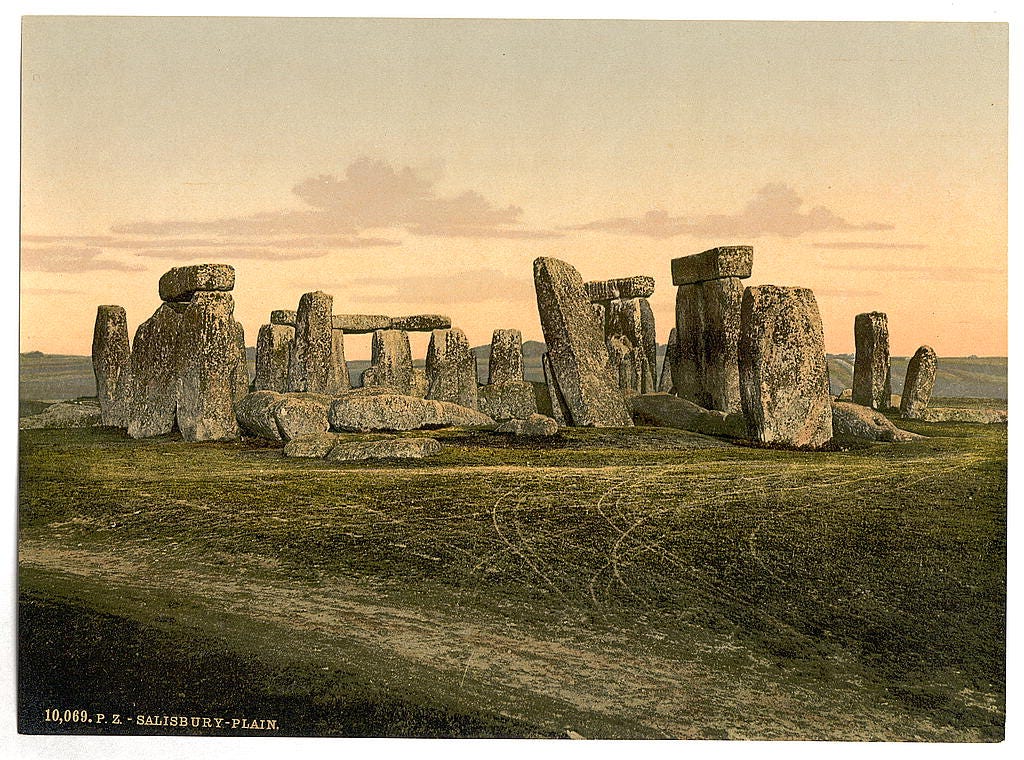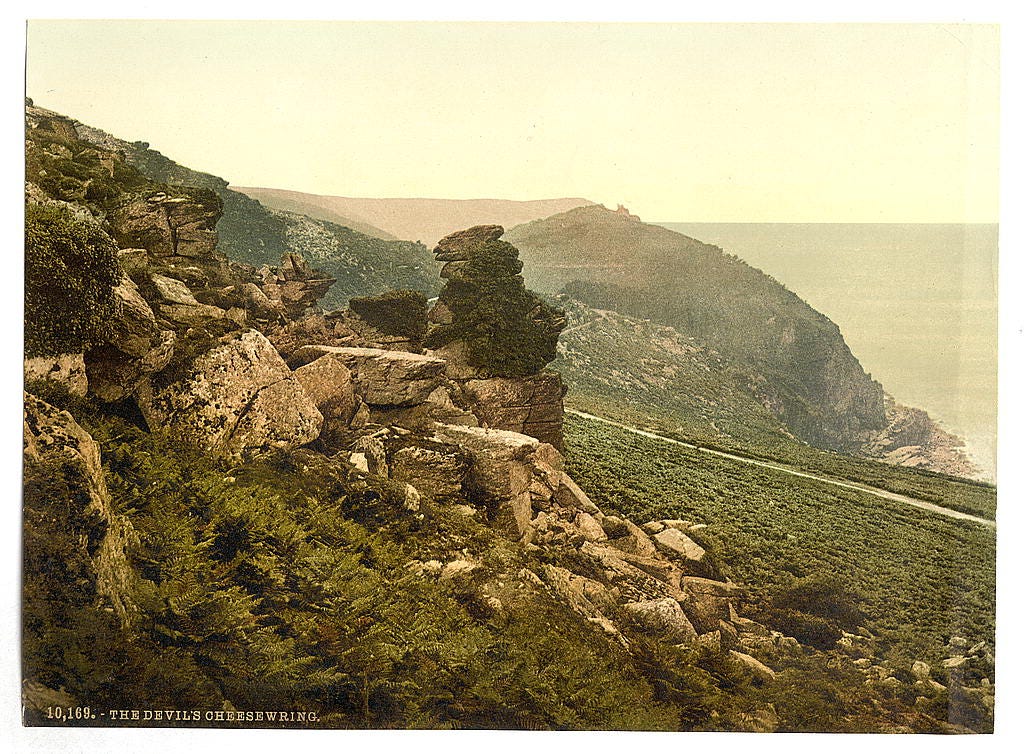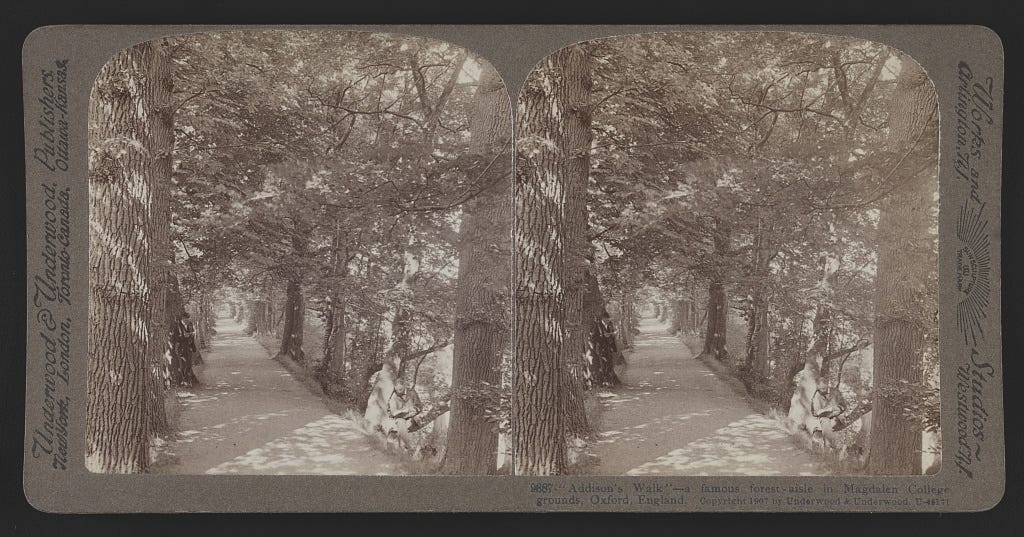Summer Saunterers Part 5
The conclusion of our series on a trip to Europe in 1906 taken by Bessie Goldsmith and Helen and Myra Bodwell.
If you missed the previous part of this story you can find it here.
Last time, we had left our travelers in Southampton, England. From there they travelled to Winchester and Salisbury, visiting the cathedrals in both cities. Bessie writes to her mother about the spiral staircases they encounter; “Now I assure you I know a great deal more about spiral stair cases than when I left home having ascended all kinds at the rate of about two a week. This one would take a prize for its narrow steep steps - I wished I had on a French bloomer costume.”
A day trip in a brougham takes them to Stonehenge; “The downs round Stonehenge roll away leaving it in ideal solitude if it hadn’t been for the policeman, the barbed wire fence, and an automobile. We didn’t pay any shilling to go inside the fence for there is just as much to be seen outside. There are ever so many of the big stones and not sprinkled all around the lot as I had expected but quite close together the outer circle being only a hundred feet in diameter.”

Travelling on to Cornwall and Devon the girls visit Bude then Clovelly, famous for its steep cobbled main street. Bessie describes the unusual street to her mother;
“The coach put us down at the outer gate and our luggage being transferred to a sled we proceeded to walk or rather run down the stair-case paved with stones which constitutes the High Street of the town.”
“There are four donkeys whose duty it is to carry people up the stair-case. Of course, we wanted to ride them but preferred to take our chances on the coach road. After lunch, while the beasts were up by the New Gate, we all mounted and rode away between the hedge rows. Needless to say, we didn’t get far in an hour by means of this mode of locomotion, though the boys managed to keep them in a fairly fast walk. You aught to see the fat old ladies who come squealing up the street with their husbands pulling in front and the boys clubbing and pushing behind.”

While in Clovelly the girls spend their time walking around the cliff paths even though the weather was less than kind. “This is the first day when the weather has interrupted in the least with our plans. But if there hadn’t been any showers, there wouldn’t have been any rainbows and we really couldn’t have afforded to miss them. After each shower we could see a bow in the sky or in the water round the foot of the cliffs.”
Travelling next to Ilfracombe and then on to Lynton, Bessie says of the drive along the coast; “Surely the ride from Ilfracombe to Lynton takes the shine off every other coaching trip. I thought the English Lakes were pretty fine but they can’t be mentioned in the same breath with this”
In Lynton they stay at the Imperial Hotel, slightly more upscale than their usual places. “It is really quite swellful. Myra says this is a very expensive week but I’m having such a good time that I feel quite reckless. There is a glass lobby with geraniums growing up to the ceiling, a bar, a billiard room, a smoking room (not that I have patronized the last three), a drawing room, and a ‘lounge’ with a balcony over the jumping off place.”
While in Lynton “we took a funny little phaeton out through the Valley of Rocks to Castle Rock and the Devils Cheese Ring.”

Then on to Oxford, by train, a journey not without its issues as Bessie describes to her mother; “It is a nuisance to travel Saturday- the coaches are all packed so it is impossible to have a luncheon basket with any comfort. At Taunton we changed and even with a porter’s assistance could not get seats together. Though we had 3rd class tickets we rode 1st class- eight in a compartment intended for five. “
Sightseeing around Oxford follows, including a long walk around Magdalen College and its grounds on a Saturday evening. “Addison’s Walk was full of lovers who afforded us no end of amusement. Those who weren’t cuddled up on the benches or under the trees were seraphically punting or paddling along the Cherwell.”

Whilst in Oxford Bessie complains in a letter to her mother, “Packing daily becomes more of a problem, particularly as we can’t seem to find anyone to do our washing.” Thankfully someone is found in Stratford as the receipt in Bessie’s scrapbook shows.
After Oxford, Stratford upon Avon is on the agenda with a day trip to Warwick to see the castle. Bessie was not impressed with the cost of admission. “Two shillings admission; wasn’t that a steep price! The pictures and drawing rooms I didn’t care particularly about, but the exterior view was most satisfying”. Being on a guided tour they were not allowed to linger, even in the gardens. “If I could have wandered round gazing at the battlemented towers all day I might have got my moneys worth but as it was I had serious thoughts of plucking some feathers out of the peacocks tails to get even with them.”

Our travelers now head to Liverpool, via Chester, to board the steamer Cestrian for the journey home to Boston. The weather is not kind to them on this crossing with strong winds, rain, fog and heavy seas. They have just a two-day respite of fine weather in the middle of the crossing. However, this does not stop Bessie from recording the highlights of the trip in her diary.
“On this funny deck wet weather is about as comfortable as when camping out- damp bed at night, damp clothes in the morning.”
“I do believe we have the very best state room on board! It has two toilet sets and mirrors, a cushioned seat and a good many hooks to say nothing of two port holes and a hole in the roof. The aforementioned hole must open right onto the bridge for someone is pacing back and forth over our heads all night. “
“I have seen four whales and two fishing boats today- I believe we are off one of the ‘Banks’. This has been what I call a ‘bright blue day’ and the white spray from the spouting whales showed up to advantage against the deep color of the smooth sea”
“We set out for the engine rooms where we spent a most delightful hour inspecting the great engines, the furnaces and the shaft alley way to the very stern of the boat. In the engine room we were 4 ft from the bottom of the ship and 20 ft below sea level.” “I was allowed to shovel some coal into the furnace all by myself.”
Arriving back in Boston Tuesday September 4th, their return is recorded in the “Local News” section of the next Andover Townsman;
“Misses Myra and Helen Bodwell and Miss Bessie P. Goldsmith have returned to Andover from a trip abroad. The time was very pleasantly passed in the British Isles and on the Continent.”
Thanks so much for reading! I hope that you have enjoyed this insight into the life of the young Bessie Goldsmith. Bessie lived all her life in Andover. A keen gardener, conservationist, historian and Andover’s first police woman, she was quite a character in town and known for driving off trespassers on her land with a shot gun.
We look forward to your likes, shares, comments and conversations. Your comments on the History Buzz website help build the success of the newsletter. Click here to open a free Substack account, so you can like, share, and comment.
Cheers!





This has been an exceptionally well done series, with well chosen selections from letters and diaries and contemporary illustrations from various rich archives woven into an informative narrative. The charming and insightful observations of Bessie Goldsmith are priceless. Thank you for your research and for making this available to us.
Bruce Earnley